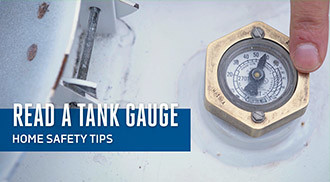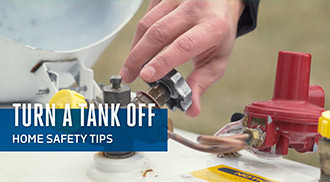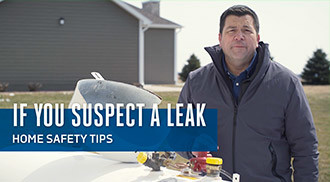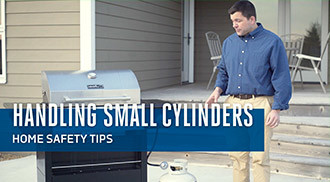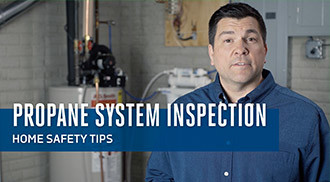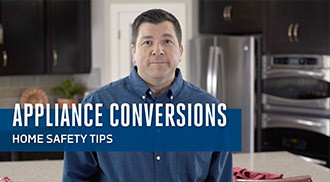To report an outage, call
1-800-448-2383
Propane is a safe and reliable fuel source. Like many other fuels, however, it is flammable and should be handled properly.
An odorant is added to propane gas that is distinctive and has been described as smelling similarly to "rotten eggs." If you ever smell gas or have any safety concerns, please contact your local Blue Ridge Energy office immediately.
Have an emergency? Call 800-726-0405 for assistance.
Steps to take if you smell gas or suspect a leak:
- Extinguish all smoking materials and any other open flames or sources of ignition.
- Get everyone outside and away from the home or building.
- Shut off the gas supply at the tank if possible. (Turn valve on tank to the right to close.)
- Call your propane supplier (use a neighbor's phone if propane smell inside the house).
- Stay outside and leave the gas off until assistance arrives.
For more detailed information on propane safety please view these safety modules provided by the Propane Education and Research Council.
-
Propane is a safe and widely used fuel. It is sometimes called liquefied petroleum gas, LP gas, or LPG.
-
Propane is transported and stored as a very cold liquid. It can cause a "freeze burn" or frostbite if it contacts the skin.
-
Propane is delivered to a home as a liquid and is pumped into the storage tank. The liquid changes to gas vapor before it leaves the tank.
-
Propane will not ignite when combined with air unless the source of ignition reaches 920°F. However, propane is flammable when mixed with air (oxygen) and can be ignited by many sources, including open flames, smoking materials, electrical sparks, and static electricity.
-
Propane gas is nontoxic and produces minimal emissions.
-
Propane is not harmful to soil or ground water.
-
Over 95% of the propane used in the United States is produced in North America.
In its natural form, propane is colorless and odorless.
Manufacturers deliberately add a chemical compound to give it a strong unpleasant smell. This helps alert customers to propane leaks, which can create a safety hazard.
The odorized propane smells like rotten eggs, a skunk's spray, or a dead animal.
Some people may have difficulty smelling propane. For example, some older people have a less sensitive send of smell. Certain medical conditions or the effects of medication, alcohol, tobacco, or drugs can make it more difficult to smell propane.
Consider purchasing a propane gas detector as an additional measure of security.
Odor loss is an unintentional reduction in the concentration of the odor of propane. This makes it more difficult to smell.
Although rare, this can be caused by the presence of rust on the inside walls of the tank or cylinder. This can happen when air and moisture get inside an empty tank or cylinder that has its valve open.
-
NO FLAMES OR SPARKS!
Immediately put our all smoking materials and other open flames. Do not operate lights, appliances, telephones, or cell phones. Flames or sparks from these sources can trigger an explosion or a fire. -
LEAVE THE AREA IMMEDIATELY!
Get everyone out of the building or area where you suspect gas is leaking. -
SHUT OFF THE GAS
Turn off the main gas supply valve on your propane tank, if it is safe to do so. To close the valve, turn it to the right (clockwise). -
REPORT THE LEAK
From a neighbor's home or other nearby building away from the gas leak, call your propane retailer right away. If you can't reach your propane retailer, call 911 or your local fire department. -
DO NOT RETURN TO THE BUILDING OR AREA...
...until your propane retailer, emergency responder, or a qualified service technician determines that it is safe to do so. -
GET YOUR SYSTEM CHECKED BEFORE REUSE
Before you attempt to use any of your propane appliances, your propane retailer or a qualified service technician must check your entire system to ensure that is leak-free.
All appliances using propane must be properly maintained in order to operate safely, properly, and efficiently.
Only a qualified service technician has the proper training to install, service, maintain, and repair your appliances. Make sure you have a qualified service technician install and service your appliances.
Contact a qualified service technician to perform an appliance inspection once a year.
Carbon Monoxide Can Be Deadly
-
Every year, hundreds of Americans die from unintentional carbon monoxide poisoning.
-
Some of these fatalities are caused by improper operation of appliances.
-
Everyone in your family is at risk if dangerous levels of carbon monoxide are present in your home. Unborn babies, infants, those with medical conditions, and the elderly are the most susceptible to its effects.
-
Carbon monoxide can strike quickly…people who are sleeping can die from carbon monoxide poisoning before ever experiencing symptoms.
What is carbon monoxide?
Carbon monoxide, also called CO, is a colorless, odorless, tasteless, and toxic gas. Here are some things that may produce carbon monoxide:
- Smoking a cigarette
- Running an internal combustion engine
- Burning candles, fuel oil, wood, kerosene, natural gas, and propane
High levels of carbon monoxide can be produced when fuels are burned incompletely.
Where do high levels of carbon monoxide come from?
High levels of carbon monoxide can be generated by internal combustion engines or by appliances that are defective or improperly installed or maintained.
Carbon monoxide can also enter a home if an appliance venting system or chimney becomes blocked (for example, by a bird's nest).
What is carbon monoxide poisoning?
High levels of carbon monoxide can cause flu-like symptoms, such as a headache, dizziness, fatigue, shortness of breath, nausea.
In extreme cases, high levels of – or extended exposure to – carbon monoxide can result in brain damage or death.
If you expect carbon monoxide is present, ACT IMMEDIATELY!
If you or a family member shows physical symptoms of carbon monoxide poisoning, get everyone out of the building and call 911 or your local fire department.
If it is safe to do, open windows to allow entry of fresh air, and turn off any appliances you suspect may be releasing the carbon monoxide.
If no one has physical symptoms of carbon monoxide poisoning, but you suspect that carbon monoxide is present, call your propane retailer or a qualified service technician to check carbon monoxide levels and your propane equipment.
Reduce the Risk of Carbon Monoxide Poisoning
The best way to reduce the risk of carbon monoxide poisoning is to have a qualified service technician check your appliances and venting systems annually, preferably before the heating season begins.
-
Keep chimneys, flues, and vents free of debris such as leaves and animal nests.
-
Keep chimneys, flues, and vents free of snow and ice.
-
Consider installing a UL-listed carbon monoxide detector on every level of your home.
-
Never use a gas oven or range-top burners to provide space heating.
-
Never use a portable heater indoors, unless they are designed and approved for indoor use.
-
Never use a barbecue grill (propane or charcoal) indoors for cooking or heating.
-
Regularly check your appliance exhaust vents for blockage.
Carbon monoxide detectors can improve safety
-
Carbon monoxide detectors are designed to sound an alarm when they sense excessive levels of carbon monoxide in the air.
-
For an extra measure of safety, we recommend that you consider installing a UL-listed carbon monoxide detector on each level of your home.
-
Be sure to follow the manufacturer's instructions regarding installation, location, and maintenance.
What is a pilot light?
-
Many propane appliances may have a pilot light – a small, constantly burning flame inside the appliance.
-
Appliances without a pilot light often have an electronic ignition instead.
-
If your appliance has a pilot light, it is an important safety feature. The pilot light ignites the main burner when needed.
When a pilot light goes out
A pilot light that repeatedly goes out – or is very difficult to light – may be signaling that there is a problem with the appliance or with your propane system.
If this occurs, DO NOT try to fix the problem yourself. Contact a qualified service technician to evaluate the appliance. Accidents and serious injuries can occur when customers attempt to fix a pilot light problem on their own.
IT IS STRONGLY RECOMMENDED THAT A QUALIFIED SERVICE TECHNICIAN LIGHT ANY PILOT LIGHT THAT HAS GONE OUT.
-
If you light a pilot light yourself, you are taking the risk of starting a fire or an explosion.
-
Many serious injuries occur when people attempt to light pilot lights.
-
Proceed with great caution and be sure to follow these rules:
-
Carefully follow all of the manufacturer's instructions and warnings concerning the appliance.
-
If the appliance is in a basement or closed room, thoroughly ventilate the area before lighting the pilot.
-
Be especially alert for the smell of propane. Sniff at floor level before lighting a pilot.
-
IF YOU SMELL GAS, DO NOT LIGHT THE PILOT LIGHT.
-
DO NOT smoke or have any source of ignition (such as flames or spark-producing materials) in the area before lighting the pilot.
-
DO NOT allow any extra or unnecessary people (especially children) to remain in the room or area of the building where you are lighting a pilot.
-
DO NOT try to light pilot lights in any area where other odors may make it difficult for you to detect the smell of a propane leak.
-
DO NOT light the pilot if a musty or damp smell persists. These conditions can possibly mask the smell of propane.
-
DO NOT apply force or use tools on the pilot light or its control. This could cause damage that leads to gas leakage. Use only your hands to operate knobs, switches, or buttons.
-
DO NOT attempt to let air out of gas lines by opening a valve or fitting inside a building or enclosed space. You may release gas and not be able to smell it.
-
DO NOT apply oil to a sticky knob or button on a gas control valve. Oil can cause the control valve mechanism to stick and malfunction.
-
Don't run out of gas!
Serious safety hazards, including a fire or an explosion, can result.
Why is running out of gas dangerous?
- Air and moisture could get into an empty or depleted storage tank. This can cause rust build-up inside the tank. Rust can decrease the concentration of the odor of propane, making it harder to smell.
- If your propane tank runs out of gas, any pilot lights on your appliances will go out. This can be extremely dangerous if not handled properly.
If you do run out of gas, A LEAK CHECK IS REQUIRED.
In many states, a propane retailer or qualified service technician must perform a leak check of your propane system before turning the gas back on.
Set up regular delivery to ensure that you have enough gas.
Establish a regular delivery schedule with your propane retailer. Also, periodically check the fuel gauge on your propane tank. If the fuel level drops below 20%, call your propane retailer.
Be prepared if a major storm is approaching.
During and after a major weather event (such as a hurricane or winter storm), propane and other types of fuel may not be readily available and roads leading to your home or farm might not be accessible for delivery.
Make sure you have an adequate supply of propane in your tank if a major storm is predicted your area.
Space heaters can be dangerous if used improperly.
You should be aware of the following hazards when using space heaters:
-
Fires and/or burns: Close proximity or contact with a flame, heating element, or hot surface area can cause fires and/or burns.
-
Fires and/or explosions: Flammable fuels or defective wiring can cause fires and/or explosions.
-
Carbon monoxide poisoning: Improper venting of appliances can cause carbon monoxide poisoning.
Before starting a grill:
-
ALWAYS follow grill manufacturer's instructions and keep written materials accessible.
-
ALWAYS keep the top open when lighting a grill until you are sure that it is lit.
-
NEVER pour an accelerant such as lighter fluid or gasoline on the grill.
-
DO NOT allow children to tamper with the cylinder or grill.
-
NEVER use matches or lighters to check for leaks.
-
ALWAYS use a leak-detection solution or thick soapy water to check connections for tightness before connecting or lighting a propane gas grill burner.
-
NEVER store or place a spare cylinder under or near a barbecue grill. The heat builds up pressure inside the cylinder, which may cause the pressure relief valve to release propane. Flash fires or explosions can result from exposing cylinders to heat.
When finished grilling:
-
Turn off the burner controls and close the cylinder valve.
-
When grill is not in use, cover disconnected hose-end fittings with plastic bags or protective caps to keep clean.
NEVER store or place a propane cylinder indoors or in an enclosed area such as a basement, garage, shed, or tent. These include outdoor portable heaters, barbecue grills, and portable generators.
NEVER store or place a propane cylinder in an area of excessive heat (120 degrees or higher) or near a stove, fireplace, or other heat sources. The heat builds up pressure inside the cylinder, which may cause the pressure relief valve to release propane. Flash fires or explosions can result from exposing cylinders to heat.
NEVER store or place a spare cylinder under or near a barbecue grill. The grill flame is a heat source that can cause the release of propane.
DO NOT smoke or have any ignition sources such as flames or spark-producing electrical tools in the area while handling or transporting cylinders.
Transporting small cylinders
ALWAYS transport and store a cylinder in a secure and upright position so it will not fall, shift, or roll.
ALWAYS close the cylinder valve and, if required, seal with a plug, even if the cylinder is empty. Ask your propane retailer if a plug is required.
ALWAYS place the cylinder in a well-ventilated area of the vehicle.
ALWAYS proceed directly to your destination and immediately remove the cylinder from your vehicle.
NEVER keep a filled cylinder inside a hot vehicle.
Testing for propane leaks
It is important to inspect your cylinder and outdoor gas appliances for leaks. Do this before using them for the first time each session as well as on a regular basis. This can be accomplished with a simple "bubble" test.
-
Apply leak detector solution or thick soapy water to the connection(s) between the cylinder valve and the regulator outlet.
-
Slowly open the cylinder valve and watch for bubbles.
-
If bubbles appear, close the cylinder valve, tighten the connection, and repeat the process. If bubbles still appear, call your propane retailer immediately.
Refilling small cylinders
Make sure your cylinder is equipped with an overfill prevention device (OPD). An OPD is a safety feature that helps prevent small propane cylinders from being overfilled. Most cylinders with OPDs have special triangular handwheels with the letters "OPD" on them. If you are uncertain as to whether your cylinder has an OPD valve on it, ask your propane retailer.
NEVER use a damaged cylinder or a cylinder that has been in a fire. All cylinders must be inspected before they are refilled, and it is against the law to refill out-of-date cylinders. The last inspection date is stamped on the cylinder.
NEVER dispose of your propane cylinder by throwing it in the trash. Check to see if there are municipal programs for collection in your area, or contact your propane retailer for guidance on disposal of the cylinder.
Repairing small cylinders or outdoor appliances
DO NOT UNDER ANY CIRCUMSTANCES TRY TO MODIFY OR REPAIR VALVES, REGULATORS, OR OTHER CYLINDER OR APPLIANCE PARTS. Propane cylinders incorporate special components such as valves, connectors, and other parts to keep them safe for use with grills and other propane appliances. Damage to any component can cause a gas leak.
DONT RISK IT! Call your propane retailer or a qualified service technician for assistance.
Important things to know before a power outage
Know what propane smells like.
It has a strong, unpleasant smell like rotten eggs, a skunk' spray, or a dead animal.
Know how and where to turn off the propane.
This includes your outdoor tank and your appliances inside. For help, contact your propane provider.
Important things to do before a power outage
Review propane safety information provided by your propane retailer.
Create an emergency preparedness plan and review it regularly with your family in order to keep them safe during a power outage or other emergency.
During a power outage
If a power outage occurs, use a battery-powered radio to listen for instructions from local authorities.
It is a good idea to turn off any lights and appliances that were operating before the outage occurred. This will reduce the risk of a power surge once the electricity returns. (You can leave at least one light on, so you will know when the power has returned.)
During an extended power outage, you may choose to use a portable generator. NEVER use a portable generator indoors or in an enclosed area such as a basement, garage, shed, or tent. This can result in carbon monoxide poisoning or death.
NEVER use outdoor propane appliances indoors or in enclosed areas. This can result in carbon monoxide poisoning or death. These include barbecue grills and portable heaters.
NEVER store or place a propane cylinder indoors or in an enclosed area such as a basement, garage, shed, or tent.
NEVER use a gas oven or ranch-top burners to provide space heating.
Wet appliances can be dangerous
A power outage can cause appliances such as a regfrigerator or freezer to leak weater. It can also cause a sump pump to stop working. If propane appliances get wet, this is a potentially dangerous situation. To help reduce the potential for injury or death, you should follow these safety rules at all times:
NEVER turn on a light switch, use any power source, or inspect your household appliances while standing in water. This can result in electrocution.
DO inspect your propane appliances for water or other damage, if it is safe to do so. If the appliances have electric components and have been exposed to water, they can create a fire hazard.
DO NOT UNDER ANY CIRCUMSTANCES TRY TO MODIFY OR REPAIR VALVES, REGULATORS, OR OTHER APPLIANCE PARTS.
After the power returns
If you suspect and of your proprane appliances, equipment, or vehicles have been under water or damages, or you have turned off your gas supply:
DO NOT use or operate appliances, equipment, or vehicles, or turn on the gas supply, until your system has been inspected by a qualified service technician.
DO schedule a time for a qualified service technician to perform a complete inspection of your propane system. The technician can also perform a leak test on the system and re-light your pilot lights.
Important things to know before a flood
Know what propane smells like. It has a strong, unpleasant smell like rotten eggs, a skunk's spray, or a dead animal.
Know how and where to turn off the propane. This includes your outdoor tank and your appliances inside. For help, contact your propane provider.
Important things to do before a flood
Make sure you have an adequate supply of propane in your tank.
Make sure your large propane tanks are fastened down securely.
Make a list of instructions on how to turn off the electricity, propane, and water.
Review propane safety information provided by your propane retailer.
Should you stay or go?
If a flood threatens your safety, you may have to decide whether or not to leave your home. Listen to a local television or radio station for information and instructions.
If you decide to stay:
BE PREPARED to move to a higher level within your home.
NEVER use outdoor propane appliances indoors or in enclosed areas. This can result in carbon monoxide poisoning or death. These include outdoor portable heaters, barbecue grills, and portable generators.
NEVER use a gas oven or range-top burners to provide space heating.
NEVER store or place a propane cylinder indoors or in an enclosed area such as a basement, garage, shed, or tent.
TURN OFF THE GAS
If a flood threatens your safety, turn off the gas.
- Turn off the main gas supply valve on your propane tank, if it is safe to do so. To close the valve, turn it to the right (clockwise).
- Turn off the gas supply valves located near individual indoor appliances. Consult your propane retailer to make sure you know where the actual valves are located and how to shut them off.
After the flood is over
Use caution when returning to your home or farm.
- Check for downed trees or power lines that can create safety hazards. Report any problem immediately.
- DO NOT enter and buildings on your property unless it is safe to do so. If it is dark, use flashlights, not candles.
- NEVER turn on a light switch, use any power source, or inspect your household appliances while standing in water. This can result in electrocution.
Floods can move, shift, or damage gas lines, tanks, and equipment.
- Check your propane tank, appliances, chimneys, flue pipes, and vent connectors. If you see any damage or blockages, call your propane company.
- If you suspect any of your propane appliances, equipment, or vehicles have been under water or damaged, or you have turned off your gas supply, DO NOT use until a service technician indicates it is safe.
- DO NOT UNDER ANY CIRCUMSTANCES TRY TO MODIFY OR REPAIR VALVES, REGULATORS, OR OTHER APPLIANCE PARTS.
- If you find a propane tank on your property that is not yours - or if your propane tank is dislodged or missing - call your propane company or fire department immediately.
Important things to know before a hurricane
Know what propane smells like. It has a strong, unpleasant smell like rotten eggs, a skunk's spray, or a dead animal.
Know how and where to turn off the propane. This includes your outdoor tank and your appliances inside. For help, contact your propane provider.
Important things to do before a hurricane
Make sure you have an adequate supply of propane in your tank.
Make a list of instructions on how to turn off the electricity, propane, and water.
NEVER put or keep a propane cylinder inside or in an enclosed area such as a basement, garage, shed, or tent.
If you live in a flood zone, make sure your large propane tanks are fastened down securely.
Review propane safety information provided by your propane retailer.
Should you stay or go?
If a hurricane approaches, you could be in danger. Listen to a local television or radio station for information and instructions.
If you decide to stay:
NEVER use outdoor propane appliances indoors or in enclosed areas. This can result in carbon monoxide poisoning or death. These include outdoor portable heaters, barbecue grills, and portable generators.
NEVER use a gas oven or range-top burners to provide space heating.
NEVER store or place a propane cylinder indoors or in an enclosed area such as a basement, garage, shed, or tent.
TURN OFF THE GAS
If a hurricane threatens your safety, turn off the gas.
- Turn off the main gas supply valve on your propane tank, if it is safe to do so. To close the valve, turn it to the right (clockwise).
- Turn off the gas supply valves located near individual indoor appliances. Consult your propane retailer to make sure you know where the actual valves are located and how to shut them off.
After the hurricane has passed
Use caution when returning to your home or farm.
- Check for fallen trees. These can damage your propane equipment.
- Check for downed power lines. These can create a major safety hazard.
- DO NOT enter and buildings on your property unless it is safe to do so. If it is dark, use flashlights, not candles.
- NEVER turn on a light switch, use any power source, or inspect your household appliances while standing in water. This can result in electrocution.
Spring and summer can be stormy seasons. Be prepared.
Know what propane smells like. It has a strong, unpleasant smell like rotten eggs, a skunk's spray, or a dead animal.
Know how and where to turn off the propane. This includes your outdoor tank and your appliances inside. For help, contact your propane provider.
Important things to do to prepare for storms:
Make a list of instructions on how to turn off the electricity, propane, and water.
Review propane safety information provided by your propane retailer.
Create an emergency preparedness plan and review it regularly with your family in order to keep them safe during a storm, power outage, or other emergency.
Be prepared and be safe
If a storm threatens your safety, special actions may be necessary. Listen to local authorities, or television and radio stations for information and instructions. If your power goes out, additional care is needed to keep safe.
NEVER use outdoor propane appliances indoors or in enclosed areas. This can result in carbon monoxide poisoning or death. These include outdoor portable heaters, barbecue grills, and portable generators.
NEVER use a gas oven or range-top burners to provide space heating.
NEVER store or place a propane cylinder indoors or in an enclosed area such as a basement, garage, shed, or tent.
After the storm is over
Use caution when inspecting your home or farm for damage:
- Check for fallen trees. These can damage your propane equipment.
- Check for downed power lines. These can create a major safety hazard.
- DO NOT enter and buildings on your property unless it is safe to do so. If it is dark, use flashlights, not candles.
- NEVER turn on a light switch, use any power source, or inspect your household appliances while standing in water. This can result in electrocution.
Important things to know before a winter storm:
Know what propane smells like. It has a strong, unpleasant smell like rotten eggs, a skunk's spray, or a dead animal.
Know how and where to turn off the propane. This includes your outdoor tank and your appliances inside. For help, contact your propane provider.
Important things to do before a winter storm:
Mark your propane tank location with a flag, pole, or stake that is higher than the average snow cover depth for your area.
Make sure you have an adequate supply of propane in your tank. In the event of a storm, roads leading to your home might not be accessible for delivery.
Make a list of instructions on how to turn off the electricity, propane, and water.
Review propane safety information provided by your propane retailer.
Should you stay or go?
If a winter storm threatens your safety, you may hve to decide whether or not to leave your home. Listen to a local television or radio station for information and instructions.
If you decide to stay:
Clear snow and ice from around your propane tank. If pipes freeze and crack, gas can leak out and create a potential danger.
Clear snow and ice away from all outdoor vents, chimneys, and flues. Whenever possible, use a brrom instead of a shovel so you won't damage your propane system.
Prevent Carbon Monoxide Poisoning
NEVER use outdoor propane appliances indoors or in enclosed areas. This can result in carbon monoxide poisoning or death. These include outdoor portable heaters, barbecue grills, and portable generators.
NEVER use a gas oven or range-top burners to provide space heating.
NEVER store, place, or usage a propane cylinder indoors or in an enclosed area such as a basement, garage, shed, or tent.
After the winter storm is over
Use caution when returning to your home or farm:
- Check for fallen trees. These can damage your propane equipment.
- Check for downed power lines. These can create a major safety hazard.
- DO NOT enter and buildings on your property unless it is safe to do so. If it is dark, use flashlights, not candles.
- Clear heavy snow and ice from regulators, regulator vents, piping, tubing, and valves. Appliance vents, chimneys, and flues must be kept clear of snow and ice so appliances can vent properly.
Extremely cold temperatures can cause pipes to freeze or crack. High winds or falling ice can move, shift, or damage gas lines, tanks, and equipment.
- Check your propane tank, appliances, chimneys, flue pipes, and vent connectors. If you see any damage or blockages, call your propane company.
- DO NOT UNDER ANY CIRCUMSTANCES TRY TO MODIFY OR REPAIR VALVES, REGULATORS, OR OTHER APPLIANCE PARTS.
- If you suspect any of your propane appliances, equipment or vehicles have been damaged, or you have turned off your gas supply, DO NOT use until a service technician indicates it is safe.
Important things to know before a wildfire:
Know what propane smells like. It has a strong, unpleasant smell like rotten eggs, a skunk's spray, or a dead animal.
Know how and where to turn off the propane. This includes your outdoor tank and your appliances inside. For help, contact your propane provider.
Important things to do before a wildfire:
Clear at least a 10-foot area around your propane tank and gas grill of any debris. Remove anything combustible, such as leaves, brush, vegetation, or rags.
Make sure the gas grill and all propane cylinders are at least 10 feet from any structure.
Make sure you have enough propane in your tank to last for a few days.
Make a list of instructions on how to turn off the electricity, propane, and water.
Review propane safety information provided by your propane retailer.
Should you stay or go?
If a wildfire approaches, you could be in danger. Listen to a local television or radio station to find out if you must leave your home or farm.
If you decide to stay:
NEVER use outdoor propane appliances indoors or in enclosed areas. This can result in carbon monoxide poisoning or death. These include outdoor portable heaters, barbecue grills, and portable generators.
NEVER use a gas oven or range-top burners to provide space heating.
NEVER store, place, or usage a propane cylinder indoors or in an enclosed area such as a basement, garage, shed, or tent.
TURN OFF THE GAS
If a wildfire threatens your safety, turn off the gas.
- Turn off the main gas supply valve on your propane tank, if it is safe to do so. To close the valve, turn it to the right (clockwise).
- Turn off the gas supply valves located near individual indoor appliances. Consult your propane retailer to make sure you know where the actual valves are located and how to shut them off.
After the wildfire is over
Use caution when returning to your home or farm:
- DO NOT enter and buildings on your property unless it is safe to do so. If it is dark, use flashlights, not candles.
- Check for downed power lines. These can create a major safety hazard.
- Inspect your propane tank, appliances, chimneys, flue pipes, and vent connectors. If you see any damage or blockages, call your propane company.
- DO NOT UNDER ANY CIRCUMSTANCES TRY TO MODIFY OR REPAIR VALVES, REGULATORS, OR OTHER APPLIANCE PARTS.
- If you suspect any of your propane appliances, equipment or vehicles have been damaged, or you have turned off your gas supply, DO NOT use until a service technician indicates it is safe.




